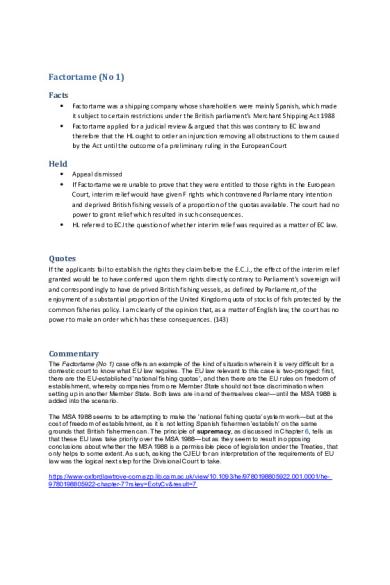Factortame (No 1) - Case note lecture PDF

| Title | Factortame (No 1) - Case note lecture |
|---|---|
| Course | Administrative law |
| Institution | University of London |
| Pages | 1 |
| File Size | 82 KB |
| File Type | |
| Total Downloads | 21 |
| Total Views | 115 |
Summary
Case note lecture...
Description
Factortame (No 1) Facts
Factortame was a shipping company whose shareholders were mainly Spanish, which made it subject to certain restrictions under the British parliament’s Merchant Shipping Act 1988 Factortame applied for a judicial review & argued that this was contrary to EC law and therefore that the HL ought to order an injunction removing all obstructions to them caused by the Act until the outcome of a preliminary ruling in the European Court
Held
Appeal dismissed If Factortame were unable to prove that they were entitled to those rights in the European Court, interim relief would have given F rights which contravened Parliamentary intention and deprived British fishing vessels of a proportion of the quotas available. The court had no power to grant relief which resulted in such consequences. HL referred to ECJ the question of whether interim relief was required as a matter of EC law.
Quotes If the applicants fail to establish the rights they claim before the E.C.J., the effect of the interim relief granted would be to have conferred upon them rights directly contrary to Parliament's sovereign will and correspondingly to have deprived British fishing vessels, as defined by Parliament, of the enjoyment of a substantial proportion of the United Kingdom quota of stocks of fish protected by the common fisheries policy. I am clearly of the opinion that, as a matter of English law, the court has no power to make an order which has these consequences. (143)
Commentary The Factortame (No 1) case offers an example of the kind of situation wherein it is very difficult for a domestic court to know what EU law requires. The EU law relevant to this case is two-pronged: first, there are the EU-established ‘national fishing quotas’, and then there are the EU rules on freedom of establishment, whereby companies from one Member State should not face discrimination when setting up in another Member State. Both laws are in and of themselves clear—until the MSA 1988 is added into the scenario. The MSA 1988 seems to be attempting to make the ‘national fishing quota’ system work—but at the cost of freedom of establishment, as it is not letting Spanish fishermen ‘establish’ on the same grounds that British fishermen can. The principle of supremacy, as discussed in Chapter 6, tells us that these EU laws take priority over the MSA 1988—but as they seem to result in opposing conclusions about whether the MSA 1988 is a permissible piece of legislation under the Treaties, that only helps to some extent. As such, asking the CJEU for an interpretation of the requirements of EU law was the logical next step for the Divisional Court to take. https://www-oxfordlawtrove-com.ezp.lib.cam.ac.uk/view/10.1093/he/9780198805922.001.0001/he9780198805922-chapter-7?rskey=EotyCv&result=7...
Similar Free PDFs

Factortame case
- 1 Pages

Case note final - case note
- 12 Pages

Formative Case Note - Case note
- 1 Pages

1 - lecture note
- 1 Pages

Virology Lecture note 1
- 14 Pages

ITM750 1 - Lecture note 1
- 22 Pages

Week 1 Case Note Template
- 3 Pages

Nydam v R CASE NOTE - case note
- 3 Pages

QUT - Lecture note 1-13
- 29 Pages

Fina 3810 lecture note 1
- 2 Pages

Chapter 1 Lecture Note MA1511
- 34 Pages

Lecture Note
- 11 Pages
Popular Institutions
- Tinajero National High School - Annex
- Politeknik Caltex Riau
- Yokohama City University
- SGT University
- University of Al-Qadisiyah
- Divine Word College of Vigan
- Techniek College Rotterdam
- Universidade de Santiago
- Universiti Teknologi MARA Cawangan Johor Kampus Pasir Gudang
- Poltekkes Kemenkes Yogyakarta
- Baguio City National High School
- Colegio san marcos
- preparatoria uno
- Centro de Bachillerato Tecnológico Industrial y de Servicios No. 107
- Dalian Maritime University
- Quang Trung Secondary School
- Colegio Tecnológico en Informática
- Corporación Regional de Educación Superior
- Grupo CEDVA
- Dar Al Uloom University
- Centro de Estudios Preuniversitarios de la Universidad Nacional de Ingeniería
- 上智大学
- Aakash International School, Nuna Majara
- San Felipe Neri Catholic School
- Kang Chiao International School - New Taipei City
- Misamis Occidental National High School
- Institución Educativa Escuela Normal Juan Ladrilleros
- Kolehiyo ng Pantukan
- Batanes State College
- Instituto Continental
- Sekolah Menengah Kejuruan Kesehatan Kaltara (Tarakan)
- Colegio de La Inmaculada Concepcion - Cebu



